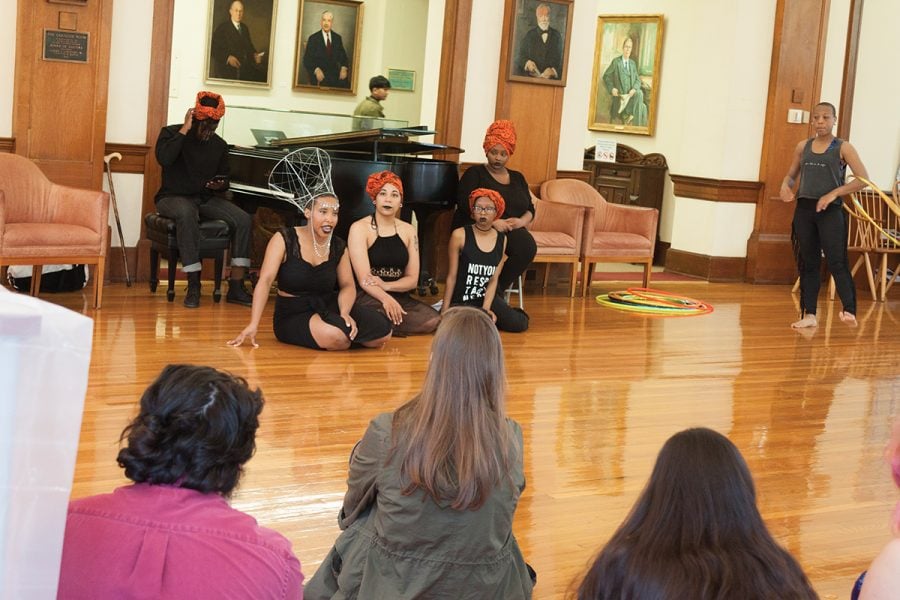Hege Library serves as host for GUS
Students lead the Interactive Art Exhibition that took place at the Guilford Undergraduate Symposium on Wednesday, April 18, 2018. // Photo by Fernando Jiménez/The Guilfordian
Eight hours. Over 60 presentations and performances. One building.
The 2018 Guilford Undergraduate Symposium, an annual event that allows Guilford students to share their academic works with the community, was held on Wednesday, April 18. The symposium was co-sponsored by Guilford Friends of the Library.
For the first time in GUS history, the majority of the presentations and performances took place at Hege Library. Guilford cancelled all classes during the day to allow students to attend more presentations and performances.
Senior political science and biology double major Caleb Anderson presented his work that won the Dean’s Award for Writing in the Physical, Natural and Health Sciences. He shared information about the topic of his research, as well as his reaction to being asked to present his work.
“I won the award for writing in science, and I was actually really surprised when they asked me to read it,” said Anderson. “Because all I did was verify the results of a … study on something called the oligodynamic effect, which is this killing effect of copper and silver, where bacteria comes into contact with it, and they die.”
Senior environmental studies and creative writing double major Emma Ross also presented her work that won the Dean’s Writing Award and discussed her writing process.
“I went on an outdoors club trip to the mountains, and we had a fire going, and I had some coffee, and we were just chilling,” said Ross. “Then I got the idea for the first line, and I just kept going. I wrote for like three hours, and I finished it that day.
“That doesn’t always happen. Sometimes I have an assignment to write, and I go back and I look at it later, and I think of a whole new direction that it can go to. I don’t really have a schedule for writing where I can write for two hours every day, but I would like to do that.”
Another presentation came from senior geology and earth sciences major Michael Johnson.
“My research is on using principal component analysis to understand the Big Five mass extinction events,” said Johnson. “Mass extinctions are a widespread decrease in biodiversity, and they have been very influential in the evolutionary history of life on Earth.
“I did a total of 15 case studies, but due to time constraints, I could only present three. I would have loved to present all of my case studies, but I would have bored everybody to death.”
Sophomore criminal justice and creative writing double major Renate Keg presented her work that won the Dean’s Writing Award and talked about her editing process.
“I feel like there’s a certain mode that I get in where it’s like, ‘Okay, I need to edit this, and so I’m just going to be harsh. I am going to be savage to myself, and I am going to cross out everything,’” said Keg. “And then I go too hard, and I cross out literally everything, so I’m like, ‘Okay, well something has to stay, or else it’s not a story anymore.’ So normally when I find myself crossing out every single line in a whole paragraph, then I know that something is wrong, and I take a little break.“
Since the first GUS in 2008, over 1,000 Guilford students have presented their work and research, representing many different academic disciplines.
CCE senior German major Dafne Sanchez Aguirre enjoyed the GUS presentations.
“It’s fun to see what everyone’s doing,” said Sanchez Aguirre. “I like that we have the opportunity, we have the space and we don’t have classes, so that we can take a day for everyone to present their work. It prepares people for future academic presentations.”









